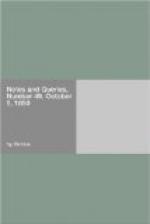“They are about demolishing and selling cathedral churches. I hear Norwich is designed already, and that the Jews proffer 600,000l. for Paul’s and Oxford Library, and may have them for 200,000l. more.”
CH.
“Is anything but,” &c.—As your work seems adapted, amongst other subjects, to check the introduction into our language of undesirable words, phrases, and forms of speech, I would call the attention of your readers to the modern phrases, “is anything but,” and the like, which have lately crept into use, and will be found, in many (otherwise) well-written books.
I read the phrase “is anything but,” for the first time, in Napier’s Peninsular War; where it struck me as being so much beneath the dignity of historical composition, and at the same time asserting an impossibility, that I meditated calling the author’s attention to it. The not unfrequent use of the same phrase by other writers, since that time, has by no means reconciled me to its use.
In the Edinburgh Review for January last (1850) I find the following sentence:—“But as pains have been taken to fix the blame upon any one except the parties culpable;” and in the July number of the same Review (p. 90.) occurs the sentence, “any impulse rather than that of patriotism,” &c.
Now, a “thing,” or “person,” or “impulse,”—though it may not be the “thing,” or “person,” or “impulse” charged as the agent,—must yet be some certain and specific thing, or party, or impulse, {295} if existing as an agent at all in the matter; and cannot be “any thing,” or “any party,” or “any impulse,” in the indefinite sense intended in these phrases. Moreover, there seems no difficulty in expressing, in a simple and direct manner, that the agent was a very different, or opposite, or dissimilar “thing,” or “person,” or “impulse” from that supposed.
I wish some persons of competent authority in the science of our language (and many such there are who write in your pages) would take up this subject, with a view to preserve the purity of it; and would also, for the future, exercise a watchful vigilance over the use, for the first time, of any incorrect, or low words or phrases, in composition; and so endeavour to confine them to the vulgar, or to those who ape the vulgar in their style.
P.H.F.
Fastitocalon.—Fastitocalon. Cod. Exon. fol. 96. b. p. 360. 18. read [Greek: Aspido ... chelonae]. Tychsen, Physiologus Syrus, cap. xxx.: did the digamma get to Crediton by way of Cricklade?
F.Q.
* * * * *
QUERIES
BISHOP COSIN’S CONFERENCE.
Basire in his Dead Man’s Real Speech (pp. 59, 60.), amongst other “notable instances” of Bishop Cosin’s zeal and constancy in defence of the Church of England, mentions




